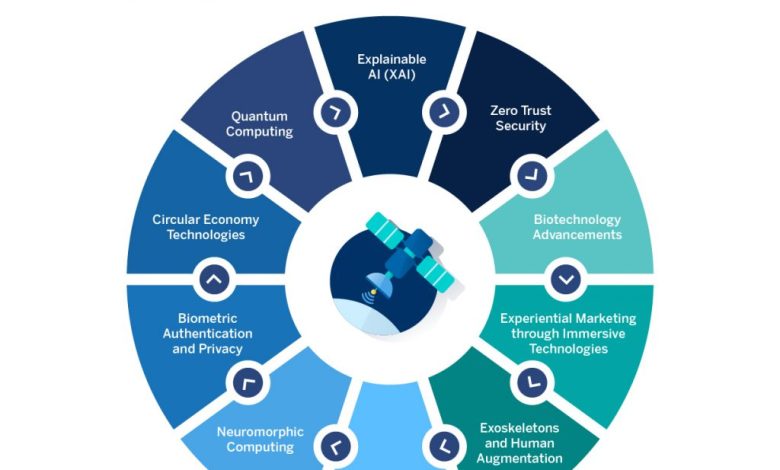The Future of Blockchain Technology: Trends to Watch

- The Rise of Decentralized Finance (DeFi)
- Interoperability and Cross-Chain Solutions
- The Emergence of Non-Fungible Tokens (NFTs)
- Enhanced Security and Privacy Features
- Integration of Blockchain in Supply Chain Management
- Regulatory Developments and Compliance Challenges
The Rise of Decentralized Finance (DeFi)
The rise of decentralized finance (DeFi) is one of the most significant trends in the blockchain technology space. DeFi refers to the movement that aims to create an open, permissionless, and transparent financial system using blockchain technology. This trend has gained momentum in recent years as more people seek alternatives to traditional financial services.
Decentralized finance offers a wide range of opportunities for individuals to access financial services without relying on traditional intermediaries such as banks or brokerage firms. By leveraging smart contracts and blockchain technology, DeFi platforms enable users to borrow, lend, trade, and invest in a trustless and secure manner.
One of the key advantages of DeFi is its ability to provide financial services to underserved populations around the world. By removing barriers to entry and reducing costs, DeFi has the potential to democratize finance and empower individuals to take control of their financial futures.
As the DeFi ecosystem continues to evolve, we can expect to see a proliferation of new decentralized applications (dApps) that offer innovative financial products and services. From decentralized exchanges to lending protocols to yield farming platforms, the possibilities are endless in the world of decentralized finance.
Interoperability and Cross-Chain Solutions
Interoperability and cross-chain solutions are becoming increasingly important in the blockchain space as the industry continues to evolve. These solutions allow different blockchain networks to communicate and share information with each other, enabling seamless transactions and data transfer across multiple platforms.
One of the key benefits of interoperability is the ability to enhance scalability and efficiency in blockchain operations. By enabling different blockchains to work together, users can access a wider range of services and applications without being limited to a single network. This can help drive innovation and growth in the blockchain ecosystem, ultimately benefiting users and businesses alike.
Moreover, cross-chain solutions can also improve security and reduce the risk of centralization in blockchain networks. By allowing for the seamless transfer of assets and data between different chains, users can mitigate the risk of single points of failure and enhance the overall resilience of the blockchain ecosystem.
Overall, interoperability and cross-chain solutions are poised to play a crucial role in shaping the future of blockchain technology. As the industry continues to mature, we can expect to see more developments in this area that will further enhance the capabilities and potential of blockchain networks. By embracing interoperability, blockchain projects can unlock new opportunities for collaboration and innovation, ultimately driving the widespread adoption of this transformative technology.
The Emergence of Non-Fungible Tokens (NFTs)
The emergence of Non-Fungible Tokens (NFTs) has been a significant development in the blockchain technology space. NFTs are unique digital assets that represent ownership of a particular item or piece of content. Unlike cryptocurrencies such as Bitcoin or Ethereum, which are fungible and can be exchanged on a one-to-one basis, NFTs are indivisible and cannot be replicated.
NFTs have gained popularity in recent years, particularly in the art and entertainment industries. Artists and creators are using NFTs to tokenize their work, allowing them to sell digital art, music, videos, and other content directly to consumers. This has opened up new revenue streams for creators and has enabled them to reach a global audience without the need for traditional intermediaries.
One of the key features of NFTs is their ability to provide proof of ownership and authenticity. Each NFT is stored on a blockchain, which serves as a decentralized ledger that records all transactions related to the token. This ensures that the ownership of an NFT is secure and cannot be tampered with. Additionally, the blockchain provides transparency, allowing anyone to verify the authenticity of an NFT and track its ownership history.
As NFTs continue to gain traction, we can expect to see further innovation in this space. Companies are exploring new use cases for NFTs, such as tokenizing real-world assets like real estate or collectibles. Additionally, advancements in blockchain technology are making it easier to create and trade NFTs, opening up opportunities for more people to participate in the digital asset economy.
Overall, the rise of NFTs represents a significant shift in how we think about ownership and value in the digital age. By leveraging blockchain technology, NFTs are revolutionizing the way we buy, sell, and interact with digital assets, paving the way for a more decentralized and inclusive economy.
Enhanced Security and Privacy Features
Enhanced security and privacy features are crucial aspects of the future of blockchain technology. As the digital landscape continues to evolve, the need for robust security measures to protect sensitive data becomes increasingly important. Blockchain technology offers a decentralized and secure way to store information, making it less vulnerable to cyber attacks and unauthorized access.
One of the key features that enhance security in blockchain technology is encryption. By encrypting data before it is added to the blockchain, sensitive information is protected from prying eyes. This encryption process ensures that only authorized parties can access the data, adding an extra layer of security to the system.
Another important aspect of blockchain technology is its transparency. While all transactions are recorded on the blockchain and can be viewed by anyone, the identities of the parties involved remain anonymous. This anonymity helps to protect the privacy of users and prevents personal information from being exposed.
Furthermore, blockchain technology utilizes consensus mechanisms to validate transactions and ensure the integrity of the data stored on the blockchain. By requiring majority approval from network participants before a transaction is added to the blockchain, the system becomes more resistant to fraud and manipulation.
In conclusion, the future of blockchain technology is bright, with enhanced security and privacy features playing a crucial role in shaping the digital landscape. By leveraging encryption, transparency, and consensus mechanisms, blockchain technology offers a secure and private way to store and transfer data in an increasingly interconnected world.
Integration of Blockchain in Supply Chain Management
Blockchain technology is revolutionizing supply chain management by providing transparency, security, and efficiency in tracking products from their origin to the end consumer. The integration of blockchain in supply chain management has the potential to streamline processes, reduce fraud, and improve trust among stakeholders.
One of the key benefits of using blockchain in supply chain management is its ability to create an immutable ledger of transactions. This means that once data is recorded on the blockchain, it cannot be altered or deleted, ensuring the integrity of the information. This feature helps to prevent fraud and counterfeit products from entering the supply chain, ultimately leading to increased consumer trust.
Another advantage of blockchain technology in supply chain management is its ability to provide real-time visibility into the movement of goods. By using smart contracts and IoT devices, stakeholders can track the location, condition, and status of products at every stage of the supply chain. This level of transparency helps to identify bottlenecks, reduce delays, and improve overall efficiency.
Furthermore, blockchain technology enables secure and instant payments between parties involved in the supply chain. By using cryptocurrencies or digital tokens, transactions can be completed quickly and without the need for intermediaries. This not only reduces costs but also minimizes the risk of payment disputes or delays.
Overall, the integration of blockchain in supply chain management is poised to transform the industry by enhancing transparency, security, and efficiency. As more companies adopt this technology, we can expect to see significant improvements in the way products are tracked, verified, and delivered to consumers. The future of supply chain management is undoubtedly intertwined with the future of blockchain technology.
Regulatory Developments and Compliance Challenges
As blockchain technology continues to evolve and gain widespread adoption, regulatory developments and compliance challenges are becoming increasingly important for businesses operating in this space. Governments around the world are starting to take notice of the potential risks and benefits associated with blockchain technology, leading to a variety of new regulations and guidelines.
One of the key compliance challenges facing businesses in the blockchain space is the need to navigate a complex and rapidly changing regulatory landscape. Different countries have different approaches to regulating blockchain technology, which can make it difficult for businesses to ensure they are in compliance with all relevant laws and regulations.
Another compliance challenge is the need to balance the benefits of blockchain technology with the need to protect consumers and investors. As blockchain technology becomes more mainstream, there is a growing concern about the potential for fraud, money laundering, and other illegal activities. Businesses operating in this space must take steps to ensure they are not inadvertently facilitating or participating in illegal activities.
Overall, staying on top of regulatory developments and compliance challenges is essential for businesses looking to leverage blockchain technology in a responsible and sustainable way. By staying informed about the latest regulations and guidelines, businesses can ensure they are operating within the law and mitigating the risks associated with this rapidly evolving technology.



